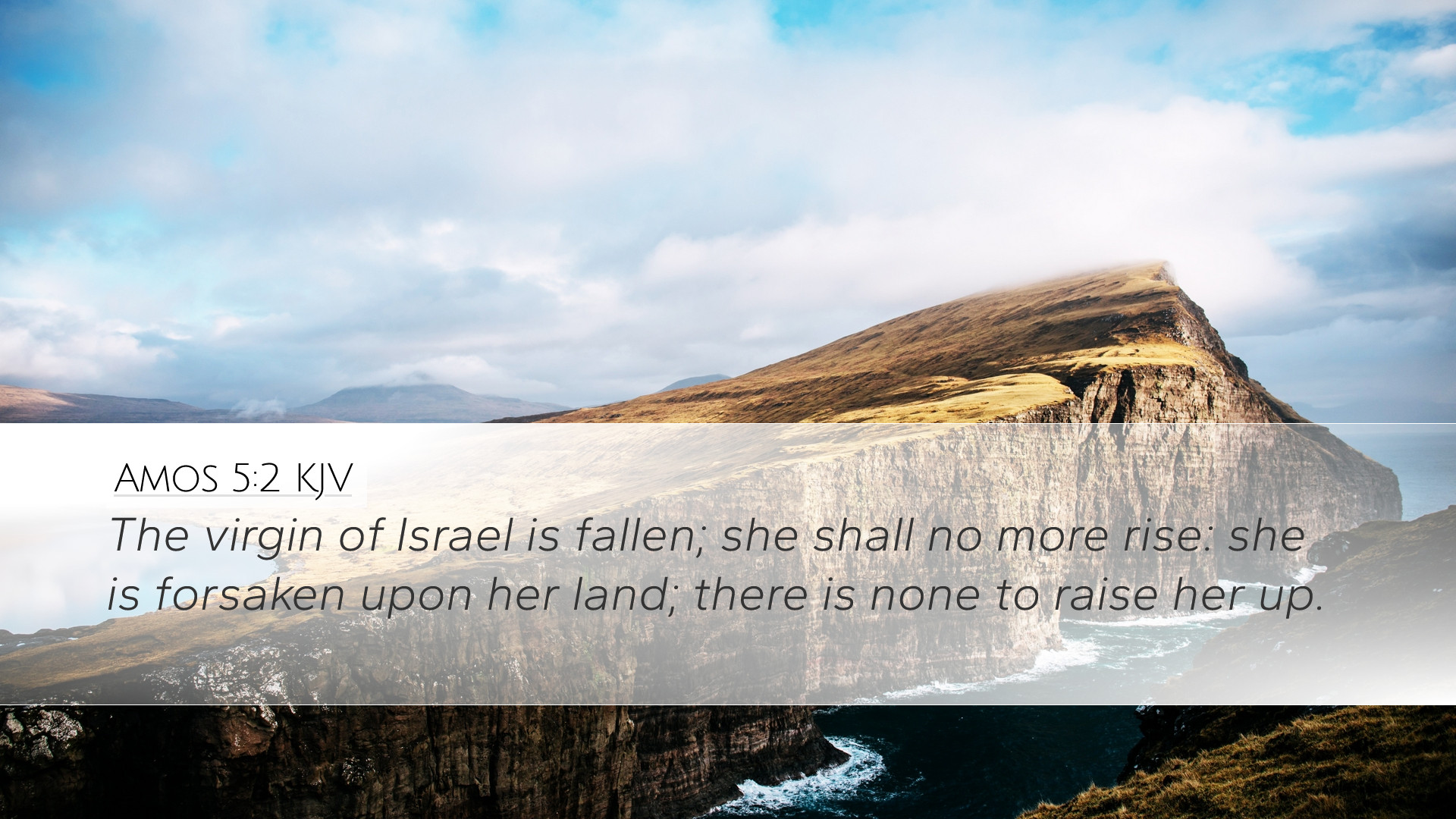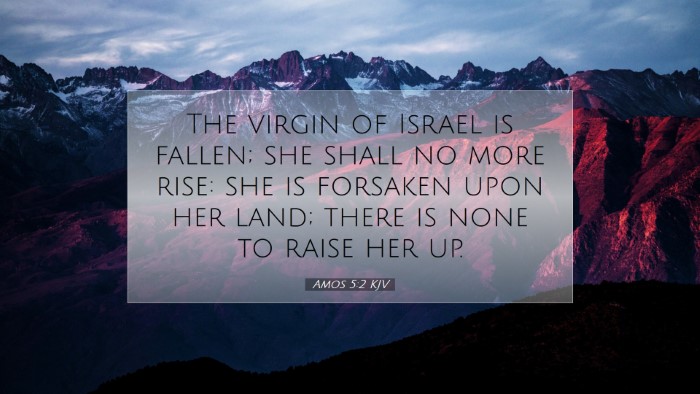Old Testament
Genesis Exodus Leviticus Numbers Deuteronomy Joshua Judges Ruth 1 Samuel 2 Samuel 1 Kings 2 Kings 1 Chronicles 2 Chronicles Ezra Nehemiah Esther Job Psalms Proverbs Ecclesiastes Song of Solomon Isaiah Jeremiah Lamentations Ezekiel Daniel Hosea Joel Amos Obadiah Jonah Micah Nahum Habakkuk Zephaniah Haggai Zechariah MalachiAmos 5:2
Amos 5:2 KJV
The virgin of Israel is fallen; she shall no more rise: she is forsaken upon her land; there is none to raise her up.
Amos 5:2 Bible Commentary
Amos 5:2 - A Commentary
Amos 5:2 reads, "The virgin of Israel is fallen; she shall no more rise: she is forsaken upon her land; there is none to raise her up." This verse captures the somber and prophetic tone of the Book of Amos, where the nation of Israel faces impending judgment due to its moral decay and abandonment of God. The weight of this verse invites us to reflect deeply on the consequences of spiritual decline and the urgency of repentance.
Context and Overview
The prophet Amos, a shepherd from Tekoa, delivered messages primarily directed toward the northern kingdom of Israel during a time of relative prosperity. However, beneath the surface of wealth and comfort lay deep social injustices, idolatry, and a disconnect from true worship of Yahweh. The backdrop of Amos's ministry is essential to understanding this verse.
Spiritual Condition of Israel
In the opening chapters, Amos condemns the injustice and corruption rampant throughout Israel. His prophetic call seeks to awaken the nation to its spiritual and social responsibilities. Matthew Henry states that the "virgin" metaphor signifies the purity and rightful standing that Israel once possessed before God. The implication of falling is a stark reminder of the loss of that status.
The Depth of Forsakenness
The phrase "shall no more rise" reflects not just a momentary setback but a dire prediction about Israel’s future. Albert Barnes explains that this indicates a complete and final judgment from God; the nation has reached a point of no return. The imagery of forsakenness emphasizes the abandonment of God’s protection and favor, leading to desolation.
Divine Judgment and Consequence
This verse serves as a warning about the consequences of spiritual apathy. Adam Clarke notes that God's judgment is inescapable when a nation or individual forsakes their covenantal relationship with Him. The forsaking upon the land signifies not just a physical desolation but a spiritual barrenness that accompanies God’s withdrawal.
Theological Insights
At the heart of Amos 5:2 lies profound theological implications. The text raises critical questions about the nature of God’s justice and mercy. It prompts reflection on the following:
- The Nature of God's Covenant: Israel's identity as 'the virgin' denotes a covenantal relationship. Their fall signifies a breach of this sacred agreement.
- The Role of Prophets: The prophetic voice, like that of Amos, functions as a means of divine warning. The rejection of such warnings leads to dire consequences.
- The Call to Repentance: The urgency of Amos's message is a call for the Israelites to turn back to God before fullness of judgment occurs.
Application for Today
The themes of Amos 5:2 resonate with contemporary audiences, prompting a reassessment of spiritual health. The church today must reflect on several key applications:
- Maintaining Spiritual Vigilance: Just as Israel fell, churches must be aware of moral complacency and idolatry in various forms, ensuring they uphold the truth of the Gospel.
- Social Justice: The injustices denounced by Amos reflect God’s concern for the marginalized and oppressed. The church is called to advocate for justice in society.
- Repentance and Restoration: Emphasis on returning to God reflects an understanding that though judgment may come, repentance opens the door to restoration.
Conclusion
Amos 5:2 stands as a poignant reminder of the consequences of forsaking God’s ways. The collective voice of public domain commentaries amplifies the essence of this verse: a nation that forgets its covenant with God sets itself on a path to destruction. For pastors, students, and theologians, the invitation lies in understanding these ancient words and applying their lessons effectively today. May we heed the warnings embedded in this scripture, pursuing a relationship with God that is alive, just, and reflective of His holiness.


